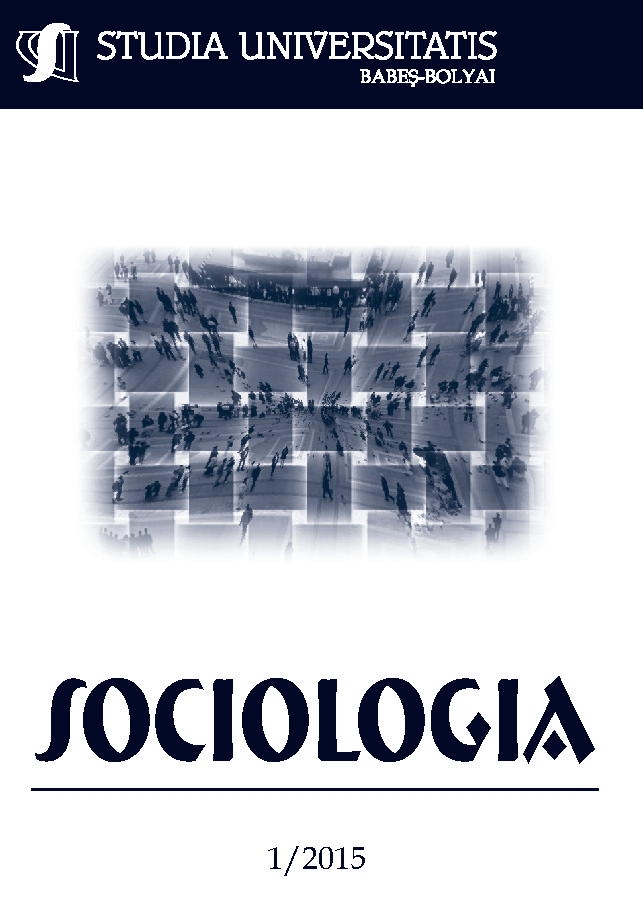THE MAKING OF CHEAP LABOUR POWER: NOKIA’S CASE IN CLUJ
Keywords:
labour power, flexibilization, neoliberal rationality, global capitalAbstract
This paper describes the procedures that minimized labour costs in a typical offshore factory of a large corporation from the global market: the Nokia factory in Cluj, Romania. Two interrelated factors contributed to this. Firstly, the arrival of neoliberal economic rationality created favourable conditions for transnational capital’s free passage through the country. Secondly, under the imperative of flexibilization, the 2011 Labour Code modifications diminished employee rights and increased employers’ privileges, allowing companies such as Nokia to freely assemble the region’s labour force – engaging it in a complex production process – and disassemble it without any major consequences. Flexibilization permitted the use of outsourced labour power in the form of external employees, partly from rural areas, with short-term contracts and minimum wages.
References
Alvesson, M. (2002). Understanding Organizational Culture. London: Sage.
Alvesson, M., Levy, D. and Willmott, H. (2003). Critical Approaches to Strategic Management. In M. Alvesson and H. Willmott (eds.): Studying Management Critically, London: Sage, pp. 92-111.
Bonefeld, W. (2003). The Politics of Change. Revolutionary Writing Common Sense Essays in Post-Political Politics: 171-185.
Brenner, N. (1999). Beyond State‐Centrism? Space, Territoriality and Geographical Scale. Globalization Studies, Theory and Society, 28(1): 39‐78.
Bourdieu, P. (1999). Precaritatea Este Astăzi Pretutindeni [Precariousness is today everywhere]. Contraofensive: 96-103. Bucharest: Editura Meridiane.
Burawoy, M. (1979). Manufacturing Consent Changes in the Labour Process Under Monopoly Capitalism. Chicago: University of Chicago Press.
-------------- (1985). The Politics of Production Factory Regimes Under Capitalism and Socialism. London: Verso.
-------------- (2009). The Extended Case Method Four Countries, Four Decades, Four Great Transformations, and One Theoretical Tradition. Berkeley: University of California Press.
Clegg, S. (1989). Frameworks of Power. London: Sage Publications.
Deetz, S. (2003). Disciplinary Power, Conflict Suppression and Human Resources Management. In M. Alvesson and H. Willmott (eds.): Studying Management Critically: London: Sage, pp. 23-45.
Drahokoupil I. (2004). Post-Fordist Capitalism in the Czech Republic: The Investment of Flextronics in Brno. Czech Sociological Review, 40(3): 343–362.
Foucault, M. (2004). A Supraveghea și a Pedepsii. Nașterea Închisorii. Bucharest: Humanitas.
-------------- (2005). Omnes et Singulatim. Spre o Critică a Rațiunii Politice. In Lumea e un mare azil. Studii despre putere. Cluj-Napoca: Editura Idea Design and Print.
-------------- (2009). Trebuie să Apărăm Societatea. Cluj-Napoca: Editura Idea Design and Print.
Guga, Ș. (2014). Criza ca Oportunitate: Schimbarea Legistlației Muncii și Înfrângerea Mișcării Sindicale. In F. Poenaru and C. Rogozanu (eds.): Epoca Traian Băsescu: 151-187. Cluj-Napoca: Tact, 151-187.
Harvey, D. (1975). The Geography of Capitalist Accumulation: A Reconstruction of the Maxian Theory. Antipode, 7(2): 9-21.
-------------- (2006). The Limits to Capital. London: Verso.
Henderson, G. (2004). Value: The Many-Headed Hydra. Antipode, 36(3): 445-460.
Holloway, J. (2003). Capital Moves. Revolutionary Writing Common Sense Essays in Post-Political Politics: 161-169.
Jessop, B. (1993). Towards a Schumpeterian Workfare State? Preliminary Remarks on Post-Fordist Political Economy, in Studies in Political Economy, 40: 7-39.
-------------- (1994). Post-Fordism and the State, in Post-Fordism. A Reader: 251-279.
-------------- (2003). The Future of the Capitalist State. Cambridge: Polity Press.
Mateescu, V. (2009). Cultura organizatională. Aspecte teoretice și metodologice. Cluj-Napoca: Editura Fundației pentru Studii Europene.
Negri, A. and Hardt, M. (2001). Empire. Cambridge: Harvard University Press.
Pittaway, M. (1999). The Social Limits of State Control: Time, the Industrial Wage Relation and Social Identity in Stalinist Hungary, 1948-1953, Journal of Historical Sociology, 12(3): 271–301.
-------------- (2007). ”The Revolution and Industrial Workers: The Disintegration and Reconstruction of Socialism, 1953-1958” in Hungarian Studies Review, XXXIV(1-2): 115–154.
Petrovici, N. (2011). “Articulating the Right to the City: Working Class Neo-Nationalism în Postsocialist Cluj, Romania”, in Kalb, D. and Halmai, G. Headlines of Nation, Subtext of Class. Working Class Populism and the Return of the Repressed in Neoliberal Europe: 57-77. London and New York: Berghahn Books.
-------------- (2012). Workers and the City: Rethinking the Geographies of Power in Post-socialist Urbanisation, Urban Studies, 49(11): 1-21.
-------------- (2013). Neoliberal Proletarization Along the Urban-Rural Divide in Postsocialist Romania, Studia UBB Sociologia, LVIII(2): 23-54.
Rose, N. (1999). Governing the Soul. The Shaping of the Private Self. London: Free Association Books.
Simionca, A. (2012). Neoliberal Managerialism, Anti-Communist Dogma and the Critical Employee in Contemporary Romania. Studia UBB Sociologia, LVII(1): 125-149.
Stoiciu, V. (2010). Noul cod al muncii sau legiferarea vechilor coduri scrise. http://www.criticatac.ro/3223/noul-cod-al-muncii-sau-legiferarea-vechilor-coduri-nescrise/ [Last accessed: 31.05.2015].
Zincă, I. (2011). Grounding Global Capitalism in Cluj-Napoca, Romania. On Territorialization and the Question of Agency. In Studia UBB Sociologia, LVI(2): 139-156.
List of Online Articles Used in the Empirical Research
“Bani de la stat pentru Tetarom III [Funds from the state for Tetarom III] Monitorul de Cluj, July 25th 2007. [Last accessed: 11.05.2015]. http://www.monitorulcj.ro/cms/site/m_cj/news/19820-bani-de-la-stat-pentru-tetarom-iii#sthash.HDGsm1N2.dpbs [Last accessed: 11.05.2015].
“Nokia nu a primit pomană...Tetarom III da”. [Nokia did not benefit from charity... Tetarom III did] Gazeta de Cluj, October 19th 2008 [Last accessed: 11.05.2015]. http://gazetadecluj.ro/stiri-cluj-investigatii/nokia-nu-a-primit-pomanatetarom-iii-da/
“Nokia va închide fabrica de la Jucu. 2200 de angajați își vor pierde locurile de muncă” [Nokia will close the Jucu factory. 2200 employees will lose their jobs] Mediafax, September 29th 2011 [Last accessed: 11.05.2015]. http://www.mediafax.ro/economic/nokia-va-inchide-fabrica-de-la-jucu-2-200-de-angajati-isi-vor-pierde-locurile-de-munca-galerie-foto-8815420
“Nokia a plecat” [Nokia left] Gazeta de Cluj, September 30th 2011. http://gazetadecluj.ro/stiri-cluj/nokia-a-plecat/ [Last accessed: 11.05.2015].
“Sulfina Barbu: Nokia își va respecta toate angajamentele” [Sulfina Barbu: Nokia will respect their agreement] Mediafax, October 7th 2011. [Last accessed: 11.05.2015]. http://www.wall-street.ro/articol/IT-C-Tehnologie/110484/Sulfina-Barbu-Nokia-Romania-isi-va-respecta-toate-angajamentele.html [Last accessed: 11.05.2015].
“Sulfina Barbu: Aștept de la Nokia să se comporte european cu angajații” [Sulfina Barbu: I expect that Nokia will treat employees by european standards] Mediafax, October 6th 2011. [Last accessed: 11.05.2015]. http://www.mediafax.ro/social/sulfina-barbu-astept-de-la-nokia-sa-se-comporte-european-cu-angajatii-8842396 [Last accessed: 11.05.2015].
“Lider de sindicat Nokia: Trebuie să fiu mulțumit de negocieri, am obținut maximum în condițiile actuale” [Nokia union leader: I have to be pleased by the negotiations, it was maximum we could obtain in these conditions] Mediafax, November 4th 2011. http://www.mediafax.ro/social/lider-de-sindicat-la-nokia-trebuie-sa-fiu-multumit-de-negocieri-am-obtinut-maximum-in-conditiile-actuale-8937433 [Last accessed: 11.05.2015].
Downloads
Published
How to Cite
Issue
Section
License
Copyright (c) 2015 Studia Universitatis Babeș-Bolyai Sociologia

This work is licensed under a Creative Commons Attribution-NonCommercial-NoDerivatives 4.0 International License.






